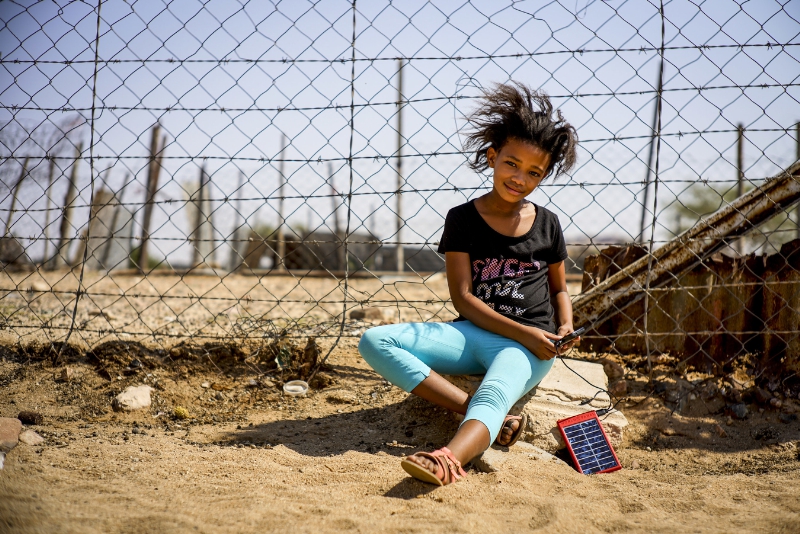
The SunStream from World Panel, an energy-enabling device designed to charge the 600 million off-grid phones in Africa. (PRNewsFoto/The Level Market)
In the middle of the 2015 Ebola outbreak, Stephanie Cox’s search for water filters was coming up dry.
“I was making a lot of phone calls, Googling, calling the experts and no one really knew what to do,” said Cox, a 17-year veteran of the humanitarian aid industry who was trying to source supplies for a friend working with the World Health Organization. “Just that morning, I had bought a pair of shoes on Amazon. That’s when the light bulb went off.”
So Cox decided to create The Level Market (TLM), an Amazon-like e-commerce website for aid supplies and raised $225,000 to fund the launch. And according to a July 26 filing with the SEC, the startup is aiming to raise another $500,000.
“What we’re investing in is growing out the platform, marketing and sales,” said Cox, now the CEO of TLM. The startup opened its website to transactions in June and has raised $25,000 so far.
Cox spent a dozen years buying aid supplies on behalf of Denver-based nonprofit International Development Enterprises. Then she sold them, working first for the solar-powered battery company Nokero and GIS software company TerraFrame.
Along the way, she saw government agencies and nonprofits struggle to find emergency supplies quickly, especially during crises. Comparing prices slowed down the process even more.
But because Amazon and other e-commerce websites don’t stock products like large tents or basic hygiene kits, Cox said aid organizations are left making calls, sending emails or browsing the web.
Even if Amazon does carry an item, she said, many buyers still need at least three price quotes from suppliers to satisfy auditors.
TLM now has a catalogue of 200 products from 48 suppliers. And it lets buyers get quotes on volume orders from more than one supplier by filling out one form rather than by contacting each individually. (Unlike Amazon, TLM leaves warehousing and shipping products to their suppliers.)
Vendors also list details about minimum order requirements, shipping location and their ability to do business in countries on the U.S. sanctions list.
Cox filed paperwork to start the company in March. TLM now has five employees in the Denver area, in addition to software developers in Pakistan and a technology advisor in Silicon Valley.
Cox said buyers include the International Committee of the Red Cross and the Save the Children Fund – as well as people in search of camping supplies.
“Our very first buyer was a guy in Iowa that bought a cook stove from us,” said Cox. “The cool thing is, what is made for international aid is also good for Colorado backpackers.”
To keep its market growing, Cox said the company plans to hit the expo and conference circuit, look for leads about humanitarian crises on social media and tap its employees’ industry contacts.
Down the line, Cox hopes to debut features for donors to use TLM, too. Instead of sending a blank check to an aid organization, donors would instead select products on the organization’s wish list and purchase them directly.

The SunStream from World Panel, an energy-enabling device designed to charge the 600 million off-grid phones in Africa. (PRNewsFoto/The Level Market)
In the middle of the 2015 Ebola outbreak, Stephanie Cox’s search for water filters was coming up dry.
“I was making a lot of phone calls, Googling, calling the experts and no one really knew what to do,” said Cox, a 17-year veteran of the humanitarian aid industry who was trying to source supplies for a friend working with the World Health Organization. “Just that morning, I had bought a pair of shoes on Amazon. That’s when the light bulb went off.”
So Cox decided to create The Level Market (TLM), an Amazon-like e-commerce website for aid supplies and raised $225,000 to fund the launch. And according to a July 26 filing with the SEC, the startup is aiming to raise another $500,000.
“What we’re investing in is growing out the platform, marketing and sales,” said Cox, now the CEO of TLM. The startup opened its website to transactions in June and has raised $25,000 so far.
Cox spent a dozen years buying aid supplies on behalf of Denver-based nonprofit International Development Enterprises. Then she sold them, working first for the solar-powered battery company Nokero and GIS software company TerraFrame.
Along the way, she saw government agencies and nonprofits struggle to find emergency supplies quickly, especially during crises. Comparing prices slowed down the process even more.
But because Amazon and other e-commerce websites don’t stock products like large tents or basic hygiene kits, Cox said aid organizations are left making calls, sending emails or browsing the web.
Even if Amazon does carry an item, she said, many buyers still need at least three price quotes from suppliers to satisfy auditors.
TLM now has a catalogue of 200 products from 48 suppliers. And it lets buyers get quotes on volume orders from more than one supplier by filling out one form rather than by contacting each individually. (Unlike Amazon, TLM leaves warehousing and shipping products to their suppliers.)
Vendors also list details about minimum order requirements, shipping location and their ability to do business in countries on the U.S. sanctions list.
Cox filed paperwork to start the company in March. TLM now has five employees in the Denver area, in addition to software developers in Pakistan and a technology advisor in Silicon Valley.
Cox said buyers include the International Committee of the Red Cross and the Save the Children Fund – as well as people in search of camping supplies.
“Our very first buyer was a guy in Iowa that bought a cook stove from us,” said Cox. “The cool thing is, what is made for international aid is also good for Colorado backpackers.”
To keep its market growing, Cox said the company plans to hit the expo and conference circuit, look for leads about humanitarian crises on social media and tap its employees’ industry contacts.
Down the line, Cox hopes to debut features for donors to use TLM, too. Instead of sending a blank check to an aid organization, donors would instead select products on the organization’s wish list and purchase them directly.


Leave a Reply